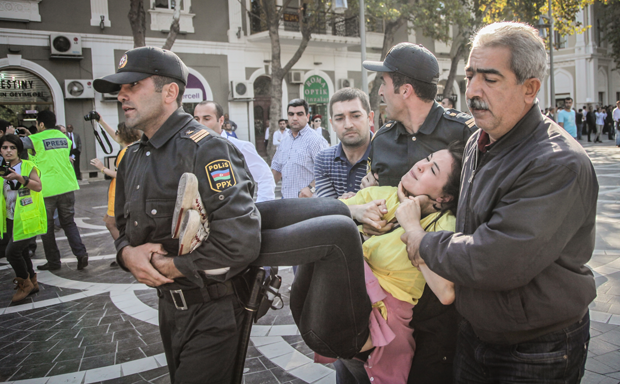Index relies entirely on the support of donors and readers to do its work.
Help us keep amplifying censored voices today.
An Azerbaijani journalist and blogger has been sentenced to five and a half years imprisonment after publishing posts deemed critical of the authorities on Facebook. Abdul Abilov, who runs the Facebook page “Stop sycophants!” was charged with illegal possession, storage, manufacturing or sale of drugs at the Baku Serious Crimes Court. The social media page was closed down shortly after his arrest.
Emin Huseynov, chairman of the Institute for Reporters’ Freedom and Safety (IRFS), is deeply concerned by the sentencing of journalists and bloggers in Azerbaijan, especially as the country has recently been handed chairmanship of the Committee of Ministers for the Council of Europe, a post Azerbaijan will hold for the next six months.
“Today’s harsh conviction shows once again the extraordinary measures that authorities are willing to take to crush criticism of their repressive policies, inconsistent with the country’s chairmanship of the Council of Europe,” Huseynov said in a statement. The IRFS has also called on the Council to “immediately appoint a special rapporteur on political prisoners in Azerbaijan” to analyse the situation in the country as well as raising the issue to the Parliamentary Assembly.
Abilov joins the eight journalist and seven bloggers and online activists already serving time in jail in the country for politically-motivated convictions, including the recent sentencing of the independent newspaper website editor Parviz Hashimli. And it’s not just journalists who are coming under fire from the authorities. Early May saw the sentencing of eight young activists on charges of attending to “cause public disorder”.
This article was posted on May 27, 2014 at indexoncensorship.org

Eurovision contestant Teo, in the music video for this year’s Belarusian entry Cheesecake (Image: Yury Dobrov/YouTube)
If you want a Eurovision of the future, imagine a faux-dubstep bassline dropping on a human falsetto, forever. That was how it felt watching YouTube footage of this year’s entrants in the continent’s greatest song-and-dance-spectacle.
The Eurovision Song Contest, born of the same hope for the future and fear of the past as the European Union, is approaching its 50th year. And strangely, it’s doing quite well. In spite of fears that the competition would end up as an annual carve up between former Soviet states, recent years have in fact seen a fairly equal spread of winners throughout the member states of the European Broadcasting Union (who do not actually have to be in Europe; a fact often missed by anti-Zionists who somehow see a conspiracy in the fact that Israel is a regular entrant in the competition is that channels in countries such as Libya, Jordan and Morocco are also members of the EBU, and technically could enter if they wish. Morocco did, in 1980). Since 2000, the spread of winners between Western Europe, the former Soviet states, and the Balkans and Turkey have been pretty much even.
While some of the geopolitics will always be with us — Turkey and Azerbaijan united in their hatred of Armenia, Cyprus and Greece douze-pointsing each other at every opportunity — the once-derided contest has in fact functioned as a genuine competition. Year in, year out, the best song in the competition tends to win, while the laziest entrants, not taking the event seriously as a songwriting competition (yes, we’re looking at you, Britain), tend to fall behind and then complain that Europe doesn’t “get” pop music.
The best songs and singers triumph, by and large. But Eurovision still does have a political edge.
Take Tuesday’s semi-final in Copenhagen. Russia’s entry, Shine, performed by the Tolmachevy Sisters and described by Popbitch as sounding like “almost every Eurovision song you’ve ever imagined” contained some unintentionally ominous lines:
Living on the edge / closer to the crime / cross the line a step at a time
Add an “a” to the end of that “crime”, and you’ve got the Kremlin’s current foreign policy neatly summed up in a single stanza.
I am not suggesting that the Tolmachevys were sent out to justify Putin’s expansionism. Nonetheless, the Copenhagen crowd were keen that Russia should know what the world thought of its foreign policy and domestic human rights record: as it was announced that Russia had made Saturday’s grand final, the arena erupted in jeering. The dedicated Eurovision fan is clearly not just a poppet living in a fantasy world of camp. They are engaged with the world, and particularly the regressive policies of countries such as Russia, Azerbaijan and Belarus, perhaps more so than your average European.
When Sweden’s Loreen won the competition in Baku, capital of Azerbaijan, in 2012, she pledged to meet the country’s human rights activists. That same year, BBC commentator “Doctor Eurovision” (he actually is a doctor of Eurovision) made explicit references to Belarus’s disgraceful dictatorship, rather than simply giggle at the funny eastern Europeans.
This raises an interesting question about how we engage with dubious regimes.
Before the Baku Eurovision in 2012, there was some discussion over whether democratic countries should boycott the competition, sending a message to Aliyev’s regime.
“No,” Azerbaijani civil rights activists told Index on Censorship. “Let the world come and see Azerbaijan.” They felt that for most of the world, most of the time, they are citizens of a far away country of whom we know nothing. They wanted to take their chance while the world was looking. I think they got it right. As discussed last week, Azerbaijan is engaged in a massive international PR campaign, but to most people in the world since that Eurovision and the attention it raised for the country’s opposition, it has not been able to entirely disguise its atrocious record on free speech and other rights.
On Friday, the International Ice Hockey Federation’s world championship will open in Belarus. Though there was some discussion of boycotting that event, it has died down. Nonetheless, journalists from Europe and North America will be covering the event, and fans will travel too.
Belarus’s macho dictator Alexander Lukashenko is a keen ice hockey fan, and will be aiming to sweep up the glory of hosting a major international sporting event, not long after the country hosted the world track cycling championships in 2013.
Ice hockey fans and sports journalists are generally not the type of people who go in for Eurovision. But maybe they should try to take a leaf out of the Song Contest supporters book. Have a look at the country around them, learn a little about the politics, and spread the word about the side the dictators don’t want us to see.
Autocrats try to use these international competitions to control the world’s view of them. We should beat them at their own games.
This article was posted on May 8, 2014 at indexoncensorship.org
This week eight young Azerbaijani activists were sentenced to between six and eight years in jail. The members of the N!DA Youth Movement, which works for democracy and social change, were convicted for possession of drugs and explosives, and for intending to “cause public disorder”. The charges are widely believed to be trumped up, and the trials have been criticised by foreign observers over “irregularities” and “shortcomings”, including inconsistencies in testimonies and mishandling of evidence.
This is just the latest addition to a long list of human rights abuses by authorities in the oil rich country. As the repression has largely been allowed to take place away from international attention, this is a good moment to remember a few things about Azerbaijan, especially as the country prepares to take over a six month chairmanship of the Council of Europe’s Committee of Ministers.
According to the latest figures, there are 142 political prisoners in Azerbaijan today. These include human rights defenders, youth activists, and a large number of religious activists, among others. There are currently 17 people serving life sentences. Ahead of the country’s presidential election last October, candidate Ilgar Mammadov was arrested. In March, he was sentenced to seven years in prison for “organizing mass disturbances” and “resisting the police”. Meanwhile, President Ilham Aliyev insists that there are no political prisoners in Azerbaijan.

(Image: Aziz Karimov)
Attacks, threats and intimidation are regular occurrences for political opponents, activists and press in Azerbaijan. Following protests in the capital Baku as Aliyev secured his third consecutive term in power last October, demonstrators were beaten and detained by police. Police also raided the offices of independent Election Monitoring and Democracy Studies Centre (EMDSC) which reported irregularities in the election. In 2012, reporter Idrak Abbasov was brutally beaten when filming the demolition of a house by the State Oil Company of Azerbaijan, allegedly by employees of the company and police. The same year, fellow journalist Khadija Ismayilova, known for covering corruption among the country’s powerful elite, was blackmailed with intimate images of her and her boyfriend. She continues to face intimidation today. These abuses are often allowed to happen with impunity.
Azerbaijan’s critical press have long been subjected to an array of attacks. Independent news outlets face economic sanctions, and are often barred from distribution networks. Some 70% of distribution is controlled by the government. Most of the nine national TV channels are either directly owned by the state or controlled by the authorities. Journalists also fall victim to legal threats. In the first six months of 2013, 36 defamation suits were brought against media outlets or journalists, four of which were criminal defamation suits. One victim of this hugely restrictive media environment is leading independent paper and Index Award winner Azadliq. The paper has been hit with £52,000 worth of fines following defamation suits, state-owned press distribution company Gasid has not been transferring payments that reflect the paper’s sales. Azadliq claims Gasid owe them some £44,000.
While the situation inside the country shifts between bad and worse, authorities have focused their attentions on a wide-reaching international PR campaign. Ahead of hosting the Eurovision Song Contest, authorities ordered urban renewal that saw houses demolished and families evicted. Vast sums have in recent years been poured into the radical regeneration and beautification of Baku, and there’s more to come. There is also the posh London bar Baku, owned by the Aliyevs; the glossy, internationally distributed Baku magazine, edited by first daughter Leyla and co-published by Conde Nast; and the sponsorship deal with Champions League finalists Atlético Madrid. Next year, Baku will again play host to a prestigious international event — the inaugural European Games.
“The Committee of Ministers supervises the execution of judgments of the European Court of Human Rights the Council of Europe…The Committee of Ministers’ essential function is to ensure that member states comply with the judgments and certain decisions of the European Court of Human Rights,” the Council of Europe declare on their website. Next week Azerbaijan will assume the chairmanship of this very Committee of Ministers. But one could say that COE is only sticking to form in its relationship with the country. Only last year, a majority in its Parliamentary Assembly (PACE) voted down a resolution on the existence of political prisoners in Azerbaijan.
This article was originally published on 8 May 2014 at indexoncensorship.org

Striker Diego Costa during the first leg of Atlético Madrid’s Champions League semi-final against Chelsea (Image: Gonzalez Fuentes Oscar/Demotix)
Atlético Madrid are the toast of world football fans at the moment. They’re having possibly their greatest season ever, qualifying for the Champions’ League Final and looking set to break the Barcelona/Real Madrid duopoly over Spain’s La Liga.
Sports fans love nothing more than an underdog story, and the Atlético one feels just right. Always the less glamorous team in the Spanish capital, they’re finally having their time in the sun. Only a complete killjoy would rain on the parade of super striker Diego Costa and his team mates.
So here I go.
Atlético’s shirts bear the advertising slogan “Azerbaijan: Land of Fire”. They are sponsored by the government of Ilham Aliyev, a man who combines the callousness of the classic dictator with the appearance and language of an aspiring sales executive who’s read one too many management manuals. His Twitter page bears the fascinatingly banal phrase: “We turn initiatives into reality.” I have absolutely no idea what that means (suggestions in the comments, please). Whatever it does mean, he’s clearly quite pleased with it, as it pops up regularly on his website.
The deal (sorry, “strategic agreement”) with Atlético came about in December 2012, and was renewed in March 2014.
The explanatory blurb on the Atlético website is packed with more nonsense of the “initiatives into reality” variety.
Atlético is not a football club, it is a “sports entity”.
“The link between Azerbaijan and Atlético Madrid,” we are told, “is much more than a traditional commercial sponsorship associated with a shirt sponsorship, because it has atremendous value, as the tool to achieve important goals, through actions of a different nature, sports, commercial, communication, marketing and corporate social responsibility for the benefit of all parties.”
This is almost poetic in its nonsense; in fact the “actions of a different nature, sports, commercial, communication, marketing and corporate social responsibility for the benefit of all parties” brings to mind no less literary masterpiece than Lucky’s monologue in Samuel Beckett’s Waiting for Godot: “…the practice of sports such as tennis football running cycling swimming flying floating riding gliding conating camogie skating tennis of all kinds…”
All this would merely be amusing if Aliyev was, say, head of a fleet car dealership in Runcorn. Unfortunately, he’s not. He’s the autocratic head of a regime bloated on oil and gas revenue that is engaged in an enormous whitewashing exercise composed of equal parts propaganda and censorship.
The propaganda part can be quite amusing: the Knightsbride nightclub called Baku, after Azerbaijan’s capital; the glossy magazine, also called Baku; the shiny skyscrapers; the on-message Eurovision Song Contest entry (Start A Fire, sung by Dilara Kazimova).
The censorship bit is rather less fun, as a search on the Index on Censorship website will quickly reveal.
There is the case of journalist Khadija Islamova, harassed and blackmailed by the authorities; Index on Censorship award winning newspaper Azadliq, threatened with financial ruin deliberately brought about by state agencies; Idrak Abbasov, brutally assaulted for daring to report on demolitions of houses by the state oil company. There is also Rafiq Tagi, a murdered columnist whose killer has never been brought to justice; dissident “Donkey bloggers” Adnan Hajizade Emin Milli, imprisoned for hooliganism after going to the police to report that they had been assaulted; reporter Eynulla Fatullayev, jailed for four years, and hit with false drug charges; critical journalist Elmar Huseynov, murdered in 2005.
Are these victims of Atlético Madrid? No, it would be unfair to say that. For a start, Atlético are not the only club to benefit from shirt sponsorship from dubious regimes; Barcelona, with their smug “més que un club” image, ditched UNICEF from their jerseys to sign a deal with Qatar, a country that locks up poets, for God’s sake. No one blames Lionel Messi for the fate of Mohammed al-Ajami.
Nonetheless, Azerbaijan’s deal with Atlético is one side of Aliyev and his cronies’ colossal image management exercise; and the imprisonment of critical reporters, bloggers and activists is the other. They cannot be separated entirely.
We should enjoy the football and praise the players, but we owe it to brave determined Azerbaijainis to ask some tough questions of Atlético’s officials, even as they celebrate.
This article was posted on May 1, 2014 at indexoncensorship.org